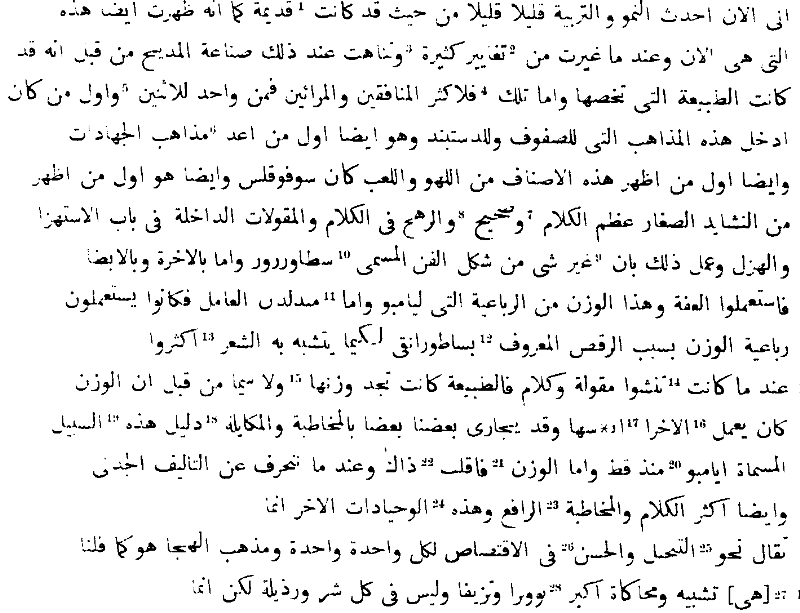Аристотель «Поэтика»: Совершенствование трагедии (1449а7)
Перевод М. Гаспарова
[a7] Здесь не место рассматривать, достигла ли уже трагедия достаточного развития в <отдельных> своих частях или нет, как сама по себе, так и по отношению к зрелищу. [a9] Как и комедия, возникши первоначально из импровизаций — <трагедия> от запевал (των έξαρχόντων) дифирамба, <комедия от запевал> фаллических песен, какие и теперь еще в обычае во многих городах, — <трагедия> разрослась понемногу, так как <поэты> развивали в ней <ее черты> по мере <их> выявления. [а14] Наконец, испытав много перемен, трагедия остановилась, обретя, наконец, присущую ей природу. [а15] Что касается числа актеров, то Эсхил первый довел его с одного до двух, ограничил хоровые части и предоставил главную роль диалогу (λόγος), а Софокл <ввел> трех <актеров> и декорации. [а19] Что же касается величия, то от <а> мелких сказаний и <б> потешного слога <трагедия>, развиваясь из сатировской <драмы>, далеко не сразу достигла своей важности; [а21] <при этом, в> и метр из <трохаического> тетраметра стал ямбическим <ибо сперва пользовались тетраметром, так как поэзия была сатировской и более плясовой; [а24] но как скоро развилась речевая часть, то сама природа отыскала свойственный ей метр, так как ямб — самый речевой из <всех> метров, а доказательство тому — в том, что в разговоре между собой мы очень часто говорим ямбами, гексаметрами же редко, да и то лишь выбиваясь из речевой гармонии>; [а28] <г> наконец, о многочисленности вставочных частей (έπεισόδια) и прочих отдельных украшений, по преданию <приписываемых трагедии>, ограничимся сказанным, потому что излагать все подробности было бы, пожалуй, слишком трудно.
Перевод В. Аппельрота
Перевод Н. Новосадского
Translated by W.H. Fyfe
Translated by S.H. Butcher
Aeschylus first introduced a second actor; he diminished the importance of the Chorus, and assigned the leading part to the dialogue. Sophocles raised the number of actors to three, and added
Translated by I. Bywater
It certainly began in improvisations — as did also Comedy; the one originating with the authors of the Dithyramb, the other with those of the phallic songs, which still survive as institutions in many of our cities. And its advance after that was little by little, through their improving on whatever they had before them at each stage. It was in fact only after a long series of changes that the movement of Tragedy stopped on its attaining to its natural form. (1) The number of actors was first increased to two by Aeschylus, who curtailed the business of the Chorus, and made the dialogue, or spoken portion, take the leading part in the play. (2) A third actor and scenery were due to Sophocles. (3) Tragedy acquired also its magnitude. Discarding short stories and a ludicrous diction, through its passing out of its satyric stage, it assumed, though only at a late point in its progress, a tone of dignity; and its metre changed then from trochaic to iambic. The reason for their original use of the trochaic tetrameter was that their poetry was satyric and more connected with dancing than it now is. As soon, however, as a spoken part came in, nature herself found the appropriate metre. The iambic, we know, is the most speakable of metres, as is shown by the fact that we very often fall into it in conversation, whereas we rarely talk hexameters, and only when we depart from the speaking tone of voice. (4) Another change was a plurality of episodes or acts. As for the remaining matters, the superadded embellishments and the account of their introduction, these must be taken as said, as it would probably be a long piece of work to go through the details.
Traduction Ch. Emile Ruelle
XII. Ainsi donc, improvisatrice à sa naissance, la tragédie, comme la comédie,
XIII. Après avoir subi de nombreuses transformations, la tragédie y a mis un terme, puisqu’elle avait revêtu sa forme naturelle.
XIV. Vint ensuite Eschyle qui, le premier, porta le nombre des acteurs de un à deux, amoindrit la fonction du choeur et donna le premier rôle au discours parlé. Sophocle institua trois acteurs et la mise en scène.
XV. Quant à l’importance de la tragédie, partie de fables légères et d’un langage plaisant; vu le caractère satirique de son origine, elle mit du temps à prendre de la gravité, et son mètre, de tétramètre, devint ïambique; car, primitivement, on employait le tétramètre, attendu que cette forme poétique est celle de la satire et plus propre à la danse. Puis, lorsque vint le langage parlé, la nature trouva
XVI. Puis on parle encore de quantité d’épisodes et des autres accessoires destinés à orner chaque partie. Ainsi donc voilà tout ce que nous avions à dire

